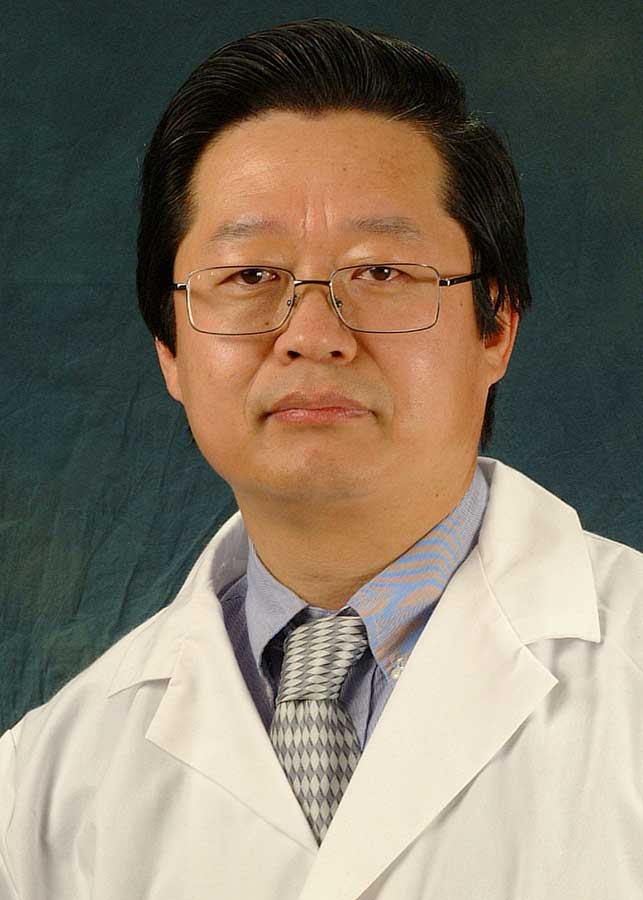Veterinary college's Meng awarded nearly $3 million in grants to study hepatitis E virus

Dr. X.J. Meng, of Blacksburg, Va., a professor of virology in the Virginia-Maryland Regional College of Veterinary Medicine's Department of Biomedical Sciences and Pathobiology at Virginia Tech, has been awarded two research grants totaling almost $3 million from the National Institutes of Health to study the hepatitis E virus.
The ultimate goal of the work is to develop a vaccine to protect people and animals from hepatitis E (commonly referred to as HEV).
“This is an exceptional achievement,” said Dr. Gerhardt Schurig, dean of the Virginia-Maryland Regional College of Veterinary Medicine. “The environment for [National Institutes of Health] funding is more competitive than ever, so I think this makes a major statement about the world-class nature of Dr. Meng’s work.”
Hepatitis E is an important human pathogen, according to Meng. The disease, caused by the Hepatitis E virus, is a major public health problem in developing countries in Asia and Africa, and in Mexico. The virus is also endemic in the United States and many other industrialized countries, according to Meng. Although the overall mortality associated with infection is generally low (less than 1 percent), it can be as high as 28 percent in infected pregnant women. Currently, there is no vaccine to prevent Hepatitis E.
The major obstacle for Hepatitis E research and vaccine development has been the lack of a practical animal model system for research on the virus and the inability to propagate it in cell culture, explains Meng.
With funding from the National Institutes of Health, Meng’s group recently discovered two hepatitus E-related animal viruses in the United States: swine hepatitis E virus (swine HEV) from pigs, and avian hepatitis E virus (avian HEV) from chickens. It has since been demonstrated that swine hepatitis E can cross species-barriers and infect humans, and that human hepatitis E can infect pigs. It is now regarded as a zoonotic disease.
With the discoveries of the two new animal viruses, Meng’s group quickly developed a pig model and a chicken model to study the hepatitis E virus. Prior to Meng’s discoveries of the two animal hepatitis E viruses, scientists were forced to use non-human primates in order to study the disease. Conducting hepatitis E research with primates at one of the National Institutes of Health regional primate centers is expensive and contains some ethical concerns, according to Meng, so developing the new animal models will be a major step forward in the research.
The first grant, entitled “Mechanism of hepatitis E virus replication and pathogenesis,” conveys total funding of $1,561,797 and the co-investigators are Dr. Patrick G. Halbur, and Dr. Yao-Wei Huang. The second grant, entitled “A chicken model to study hepatitis E virus pathogenesis” includes funding of $1,266,300 and the co-investigators are Dr. F. William Pierson, Dr. Tanya LeRoith, and Dr. Yao-Wei Huang. Both grants begin on March 1, 2008, and will support four years of work.
The grants will enable researchers to learn more about the molecular mechanisms of hepatitis E replication and pathogenesis by using pigs and chickens as animal model systems. Specifically, the researchers will study how the virus causes hepatitis, the gene(s) that are responsible for virulence, the mechanism(s) for cross-species infection by the hepatitis E virus, and how to attenuate the virus for vaccine development purpose. Ultimately, the researchers hope to develop a vaccine against this important human pathogen.
Meng’s laboratory in the college’s Center for Molecular Medicine and Infectious Disease is considered one of the world’s leading hepatitis E virus research centers. Previously, he had received nearly $2 million dollars from the National Institutes of Health to study the same virus. Meng currently chairs the Hepatitis E Virus Study Group on the International Committee on Taxonomy of Viruses.
Funded by the United States Department of Agriculture and several private corporations, Meng’s lab also studies several economically important animal viruses including porcine circovirues, and porcine reproductive and respiratory syndrome virus. Recently, Meng’s lab successfully developed the first United States Department of Agriculture fully-licensed vaccine, Suvaxyn® PCV2 One Dose™, against porcine circovirus-associated diseases, an economically important swine disease worldwide. Virginia Tech has licensed the vaccine to Wyeth Inc. and Fort Dodge Animal Health Inc., and the vaccine is currently on the United States and Canadian markets, and has now begun to enter the global markets. The vaccine is saving millions of dollars each year for the swine industry.
Prior to joining the college in 1999, Meng served as senior staff fellow of the Molecular Hepatitis Section of the Laboratory of Infectious Diseases at the National Institutes of Health’s National Institute of Allergy and Infectious Diseases.
Meng earned his doctor of medicine from Binzhou Medical College in Binzhou, Shandong, People’s Republic of China; a master’s degree in microbiology and immunology from the Virus Research Institute, Wuhan University College of Medicine in Wuhan, Hubei, Peoples Republic of China; and a doctorate in immunobiology from the Department of Microbiology, Immunology and Preventive Medicine at the Iowa State University College of Veterinary Medicine in Ames, Iowa.
The Virginia-Maryland Regional College of Veterinary Medicine is a two-state, three-campus professional school operated by the land-grant universities of Virginia Tech in Blacksburg and the University of Maryland at College Park. Its flagship facilities, based at Virginia Tech, include the Veterinary Teaching Hospital, which treats more than 40,000 animals annually. Other campuses include the Marion duPont Scott Equine Medical Center in Leesburg, Va., and the Avrum Gudelsky Veterinary Center at College Park, home of the Center for Government and Corporate Veterinary Medicine. The Virginia-Maryland Regional College of Veterinary Medicine annually enrolls approximately 500 Doctor of Veterinary Medicine and graduate students, is a leading biomedical and clinical research center, and provides professional continuing education services for veterinarians practicing throughout the two states. Virginia Tech, the most comprehensive university in Virginia, is dedicated to quality, innovation, and results to the commonwealth, the nation, and the world.




